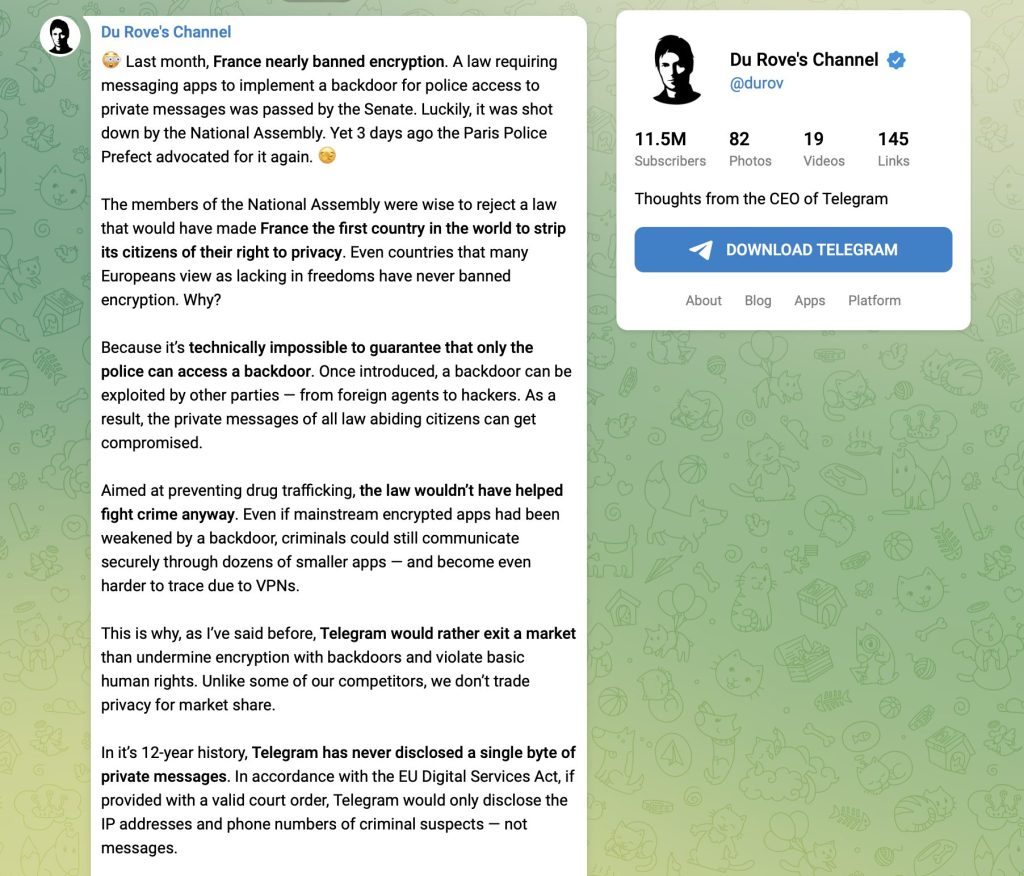Telegram User Privacy at Risk? CEO Threatens EU Exit Over Encryption Backdoor Push

Key Takeaways:
- Durov stressed that encryption backdoors cannot be limited to law enforcement use and pose serious risks, as they can be exploited by hackers, foreign agents, and other malicious actors.
- Telegram updated its terms in September 2024 to allow the sharing of IP addresses and phone numbers with authorities if presented with valid court orders.
Telegram CEO Pavel Durov has issued a strong statement reaffirming the platform’s commitment to user privacy, even if it means leaving certain markets.
This comes in response to recent legislative attempts in France and other parts of the European Union that are looking to mandate backdoor access to encrypted messages for law enforcement.
Durov referenced a recent French Senate proposal that would have required messaging platforms to introduce encryption backdoors.
Although the law was ultimately rejected by the National Assembly, the conversation around weakening encryption for law enforcement purposes continues to resurface—most recently advocated by the Paris Police Prefect. Durov warned that such efforts pose a threat to user privacy and digital freedom.
“Even countries that are often criticized for lacking civil liberties have never gone so far as to ban encryption,” Durov said.
He emphasized the technical risks of backdoors, explaining that once such a vulnerability exists, it cannot be restricted to law enforcement use alone—making it exploitable by hackers, foreign intelligence agencies, and cybercriminals alike.
Laws Ineffective With Criminals Moving to Less Regulated Apps
Durov also questioned the effectiveness of such laws in combating crime.
He pointed out that criminals would likely move to smaller, less-regulated apps and continue using VPNs to evade detection, while law-abiding citizens would suffer the consequences of compromised privacy.
Telegram, known for its encrypted communication features, has maintained a strict stance on protecting user data. Over its 12-year history, the company claims to have never disclosed private message content.
Under the EU Digital Services Act, Telegram only provides limited metadata—such as IP addresses and phone numbers—to authorities with valid court orders, not the contents of messages themselves.
Telegram Policy Change Implemented in September
Despite this firm stance, Telegram did introduce a policy change in September 2024, updating its terms of service to allow for limited data disclosure to law enforcement.
Under section 8.3 of the updated terms, Telegram now states it will share user IP addresses and phone numbers upon receiving legal requests, such as court-issued warrants.
Still, Durov made clear that Telegram’s core principles remain intact: “We don’t trade privacy for market share.”
As pressure from regulatory bodies continues, particularly from the European Commission’s latest push for surveillance capabilities, Durov’s message is unambiguous—Telegram CEO said he will not compromise encryption, even if it must leave certain countries to uphold that standard.
Telegram CEO’s Arrest, Censorship-Resistant Era Over
Last year, Durov was arrested at an airport on the outskirts of Paris, France, on Aug. 24. The Russian-born billionaire was charged with many crimes, including allegedly being complicit in drug trafficking, dissemination of child pornography, fraud, money laundering, and illegal provision of cryptographic services.
Since Durov’s release, Telegram has been facing pressure from governments to share user data.
Daria Lysenko, a crypto lawyer with the law firm SBSB, recently said the regulatory environment is shifting, and tech companies like Telegram may be forced to comply with the government’s demands to share private user information.
The post Telegram User Privacy at Risk? CEO Threatens EU Exit Over Encryption Backdoor Push appeared first on Cryptonews.




